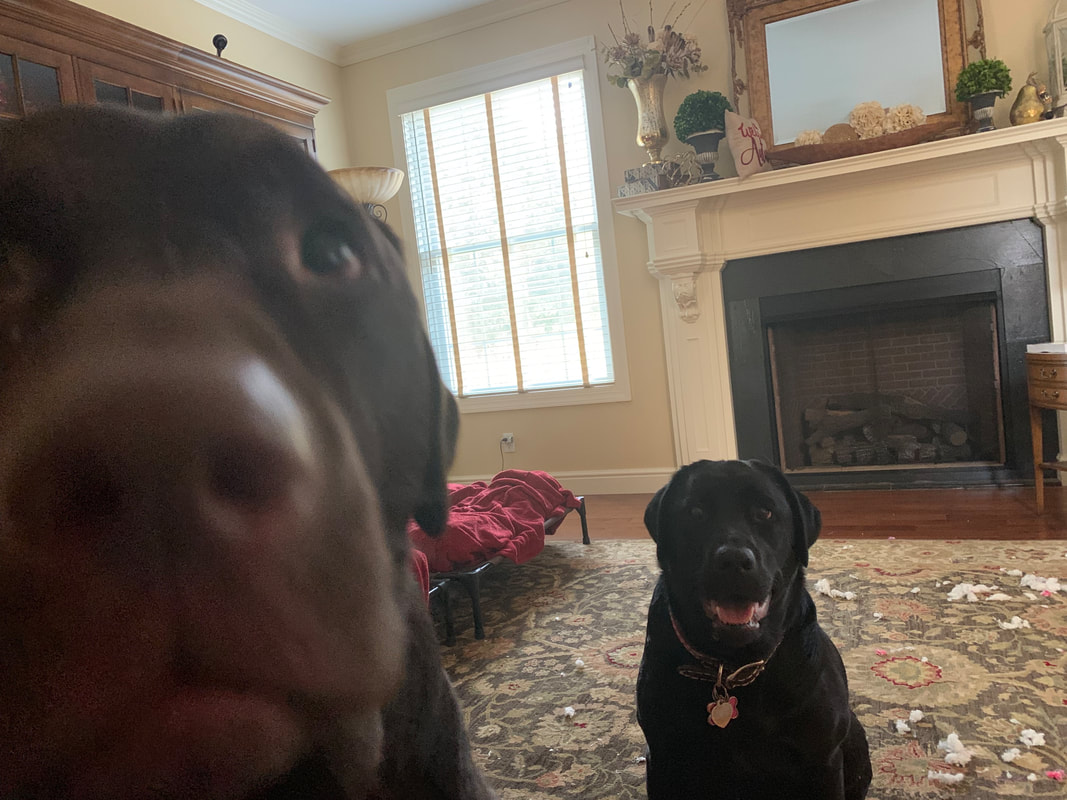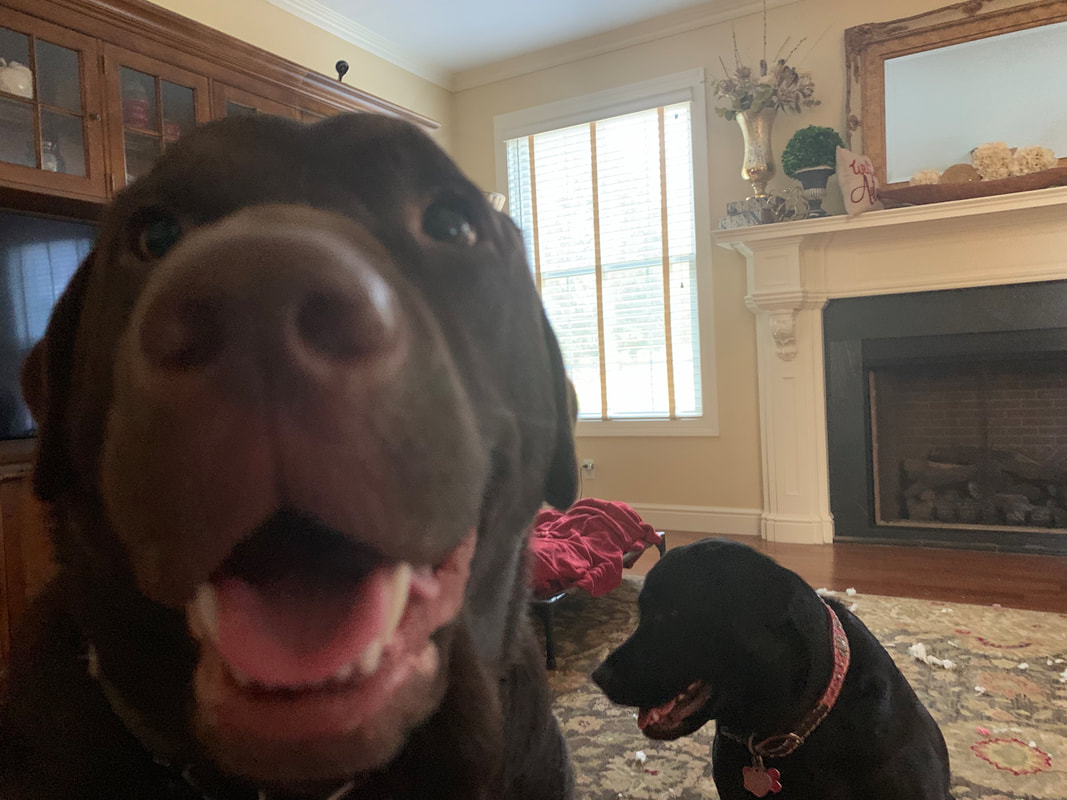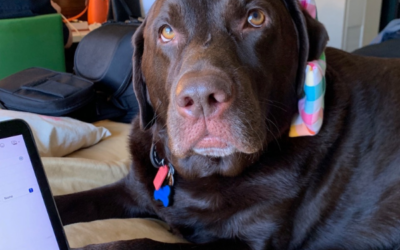What is Littermate Syndrome?
Don’t get me wrong, we love Jake and Maggie but they have formed such a bond with each other that it has made it extremely difficult in areas of training and socialization. We are giving it our all and doing everything we can to work through the problems. They are incredibly sweet, loving, and smart and I know that once we get some issues under control, everything will be as we planned.
“Jake photobombing my picture of Maggie”.

“Jake is pretty happy with himself and Maggie has lost interest in the picture”

What is littermate syndrome?
Littermate syndrome is when two puppies from the same litter are raised in the same home and develop a bond with each other. This early bond to one another can cause dog on dog aggression in the future and prevent the puppies from bonding to you. Additionally, these two puppies can become so bonded that when they are separated from each other they can develop severe separation anxiety. Sometimes when puppies of the same age are adopted and raised at the same time, but are from different litters, can still develop littermate syndrome. Other behavioral issues that can develop are:
- The failure to learn simple commands because the focus on each other.
- Fearful to unfamiliar stimuli
- Fighting amongst littermates later in life
- Littermate syndrome causes dogs to not go through their normal developmental process and takes a huge amount of work to overcome once it is present. At that point you aren’t simply asking a dog not to be bad, you are trying to socialize them long after their “socialization window” has closed. It is hard work!
Early on we saw some aggression within their little circle of two but we stopped that. It was hard at first to determine if they were play fighting or it was aggressive but we got it under control. We have not experienced Jake and Maggie bonding so much that they are not interested in us. They have very much bonded with us. The problem lies with basic obedience; ie pulling on the leash, reactive to other dogs and situations, and extreme anxiety when separated from each other. When the pups were young, our neighbors dog in MO would charge them in the yard. It was a continuous problem of dealing with an unruly strange dog which brought on fear and distrust in Jake and Maggie when they were young and it has never left them.
I would highly discourage anyone talking about or getting littermates. We were told that with having two, the one puppy who needed more correction would tend to follow the one who was picking up on the commands faster but this has not been the case with us. Maggie has always been the one who listens on command and has picked up training faster but she will follow Jake who has always been the one to give us the most trouble. When we recently took the dogs to their TDI training at Misty Pines, the trainer was quick to pick up that Jake is the trigger for Maggie.
Ways to help stop Littermate Syndrome:
- Start socializing them at a young age.
- Take a puppy training class.
- If you are crate training them, keep them in separate cages.
- Start separating them in small increments like going outside, riding in the car, to the vet, etc.
- Re-home one of them until training is complete and both animals are well adjusted.
- Train one inside while training the other outside.
- Keep them in separate rooms in the house for training and attention.
- Take a walk with the dogs but in two separate areas with two separate handlers.
- Train the dogs within site of each other and then out of site and back again.
- Plan outings with one dog at a time and introduce them to things they will see like strollers, other dogs, other people, carts, wheel chairs, cars, etc.
- With you as their trainer, make sure you are giving a timely command and correction. You have 3 seconds before their attention span is lost. Correcting them later will not do any good.
- Correction time followed by praise is so important. “Leave it, good girl” for example.
- Keep a notebook of behavior issues and triggers your dog is experiencing so that your trainer can be better informed when working with them.
We have taken Jake and Maggie to stores, restaurants, several training classes, have trained them at home, separated them, only to still be dealing with issues. It will just take more time and more training. They have passed their beginner training in MO, their CGC tests in PA and have entered TDI training classes with their test scheduled for November 8th. If they pass, they will be full fledged therapy dogs. If they do not do well in this training and outside of training, I will reschedule the test for March. We always get a good report when they are at the groomers and have been told they are great dogs. We take part in the blame in training as having two pups the same age at the same time is something we have never done before. It is still a learning process for us to and that is also why we enlisted the help of a professional. Be smart to know that sometimes you need outside help for you and your pet because you are being trained to which in turn always helps your dog.
With Jake and Maggie, trigger times are random. One dog may bother them when another will not. One minute they pull and the next they walk fine. But they are always much better and they listen better when separated and are by themselves. We are working to make sure they are always well behaved and I am certainly making notes as we go along on what needs improved for our training sessions over the next month. Wish us luck!!!

You Might Also Like
What Spring Weather Will Reveal About Your Home
Happy Wednesday, everyone! What Spring Weather Will Reveal About Your Home. Spring weather can be quite the revealing element! After weathering the winter out, with all the cold, rain, and dryness it brings, blooming into spring will highlight everything wrong with...
How To Be The Kind Of Traveler Others Are Grateful For
Happy Wednesday, everyone! How To Be The Kind Of Traveler That Others Are Grateful For. I typically talk about animals and food, but after taking a quick trip to Tennessee last year, I thought this post was fitting. I have wonderful memories of my trip to Tennessee...
10 Reasons To Learn To Cook
Happy Wednesday, everyone! Do you love to cook? Here are 10 Reasons To Learn To Cook! As you know, I’ve written three cookbooks and am working on my 4th cookbook. I found my love for cooking and baking from my grandparents and parents. I’m lucky to have Mr. TAL,...




0 Comments